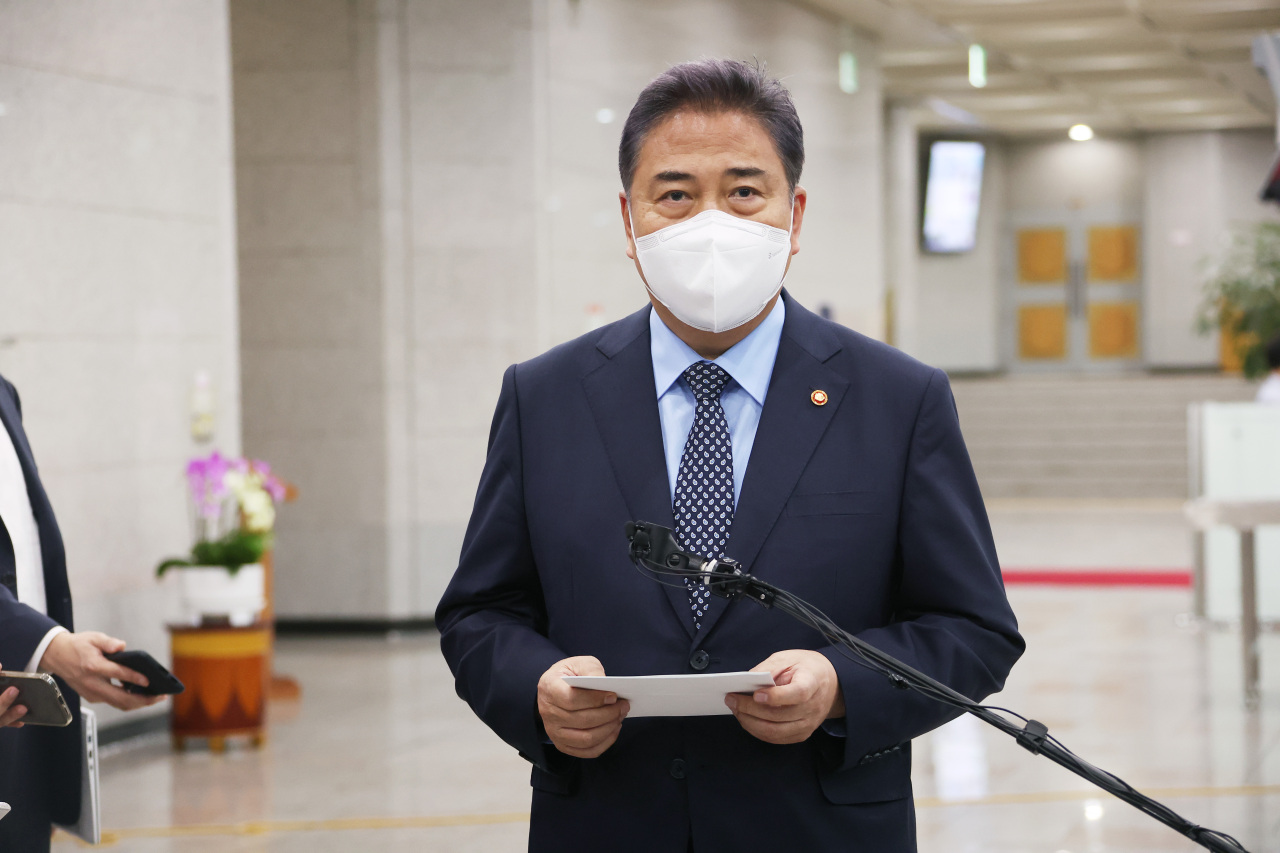South Korean Foreign Minister Park Jin is taking off for his first official trip to China on Monday, where he will meet with his Chinese counterpart, Wang Yi, to discuss a series of issues including regional security and economic cooperation.
Park were to departed from Seoul Air Base to Qingdao, Shandong province, for the three-day trip from Monday to Wednesday. The bilateral talks between Park and Wang is slated for Tuesday.
“(On the trip to China) I plan to look back on and assess the progress in development of South Korea-China relations, and also discuss on the next 30 years of the bilateral relations,” Park told reporters before leaving the Foreign Ministry headquarters in Seoul.
Saying he seeks to strengthen strategic communication with China, Park said he will also hold an “in-depth” discussion on North Korea’s denuclearization, and security and economy issues, including stabilizing global supply chains.
While Park’s trip comes as the two countries celebrate 30 years of diplomatic relations -- the date falls on Aug. 24 -- experts here raised concerns that heightened tensions between Washington and Beijing leave little room for the neighboring countries to improve ties.
One of the sticking points that may pop up in their discussion is the so-called “Three Nos” China policy presented by Korea’s former administration.
China has demanded the Yoon Suk-yeol administration, inaugurated in May, uphold the policy as Korea has made a promise to do so. Under the previous Moon Jae-in government, the Three Nos policy refers to a decision to not deploy additional US-made Terminal High Altitude Area Defense anti-missile system in Korea; to not participate in a US-led missile defense network; to not get involved in a trilateral military alliance with the US and Japan.
The incumbent Yoon administration, however, maintains the policy was only a temporary position of the former government, and that it is not an official agreement made with the Chinese government.
The sticking points on the economic front is Seoul’s entry into a series of US-led initiatives in the region, such as the Indo-Pacific Economic Framework for Prosperity.
South Korea joined the regional economic initiative, which is aimed at setting new regional rules in fields of supply chain, trade, digital economy and infrastructure, as an initial member along with 12 other countries, including Japan, in May.
But because the US’ intention for forming the IPEF is largely seen as an attempt to keep China in check, Beijing has strongly criticized Seoul for its entry.
China has also lashed out at South Korea’s joining of a semiconductor dialogue, or the so-called “Chip 4” alliance put together by the US, that also includes Japan and Taiwan -- all of them global chip powerhouses.
Chinese officials and state-run media outlets have conveyed sharp remarks, with one of them even saying it would be “commercial suicide” for Seoul to accept the US’ invitation, threatening it could lose China, which is its biggest trading partner in the semiconductor industry.
In his talks with Wang, the South Korean foreign minister is expected to explain that Korea’s intention in taking part in the US-led initiatives is not to keep China in check. Yoon has ordered Park to provide “ample explanations to China to leave no misunderstanding,” according to the foreign minister.
“Chip 4 is a consultative entity to forge cooperation on the semiconductor supply chain. It is not aimed at excluding a specific country. So I will discuss and consult all these issues with China,” Park said Monday.
On Taiwan, Park said South Korea respects the “One China” principle and Beijing’s sovereignty for security.
“At the same time, peace and stability in Taiwan Strait is also very important, for peace and stability of the Korean Peninsula,” Park added.
China has already been raising the intensity of its rhetoric that South Korea has been presenting diplomacy policies that largely align with the US. But the situation could worsen between Seoul and Beijing, following US House Speaker Nancy Pelosi’s visit to Taiwan, Chung Jae-heung, a researcher at the Sejong Institute said.
“US-China relations reached a new low due to Pelosi’s recent trip to Taiwan. And this would highly affect the talks between South Korea and China,” Chung told The Korea Herald.
“Many of the topics that stand in between are closely related with the United States, like the additional deployment of THAAD. And it appears to be highly likely that Seoul and Beijing will stand at odds on those issues.”
For Park’s visit, Qingdao was chosen instead of the capital city of Beijing, due to strict quarantine measures.
Park’s trip to China comes a month after the two diplomats met in person for the first time at the G-20 Foreign Ministers’ Meeting in Bali, Indonesia, on July 7. They also met at the ASEAN Foreign Minister Meeting in Phnom Penh, Cambodia, held last week.
By Jo He-rim (
herim@heraldcorp.com)








